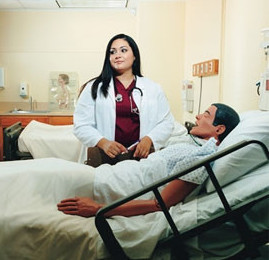Once I made up my mind that I wanted to go to San Diego instead, I dreaded having to tell my recruiter that I was no longer moving forward with the Kaiser job. If any of you have backed out of an assignment before, you know how recruiters can get nasty real quick. I remember one of my friends telling me that his recruiter threatened him with a lawsuit even though he backed out more than 30 days prior (his contract stated he can cancel an assignment with a 30-day notice).
The truth it, I knew my recruiter/agency couldn’t do anything to me since I never actually signed a contract. Part of me still wanted to work with Kaiser eventually, just to see what it’s like. So instead of cancelling completely, I asked if my assignment could be postponed until April.
Of course, my recruiter was over dramatic. He said I was leaving Kaiser with ultimately no providers, since they were counting on me to start. He must have forgotten that he told me he had placed 2 other providers at Kaiser to start right before me. He made it seem that the clinic was going to be without any providers. My interviewer there told me they have over 100 providers at any given time.
My recruiter said he didn’t know how Kaiser would take this and maybe they would put be on a black list. I laughed at that because I was almost done with credentialing with them (which takes 60 days), so I knew they wouldn’t mind the convenience of having me in the future.
He also asked me if I was sure I could get another job in January on such short notice. He seemed very doubtful. I laughed at that too. At this point in my career, I have worked in over 20 different practices, so my connections are endless. Not to mention I already had another job secured.
I was glad when that conversation was over. A few days later he let me know that Kaiser said it was actually fine for me to start with them in April. But he needed to know if I was 100% committed. I told him I would let him know in January after I start my new assignment. April was months away.
He clearly didn’t like that response because he sent me a long message saying how they can’t wait that long – and how I need to hold my commitment to that start date – and if I don’t start in April after all then it will damage my name with them and also their relationship with the site too. Blah Blah Blah.
I did not answer because at that time I was focusing on meeting my newborn niece, the upcoming holidays, and my assignment in San Diego. I didn’t appreciate the way he was “threatening” me, and the fact that he sent me the same message AGAIN on Christmas eve with a “merry Christmas” at the end. -_-
My first week in San Diego, I was obviously busy with orientation and adjusting to my new job. That didn’t stop him from blowing up my phone every single day. Multiple missed calls, voice messages, text messages, emails, and even his co-workers were calling me daily! I was so furious because I had already told him I would let him know once I started my new job. One thing at a time….
But since he couldn’t respect my decision and continued to “harass me”, I texted him on Friday to let him know my answer for starting at Kaiser in April was “No Thank you”. He couldn’t even accept that decision either, he responded with all of the reasons why I should work with Kaiser after all.
The truth is, I do want to work at Kaiser. But I am extremely turned off by his lack of professionalism and is not someone I would ever want to work again with in the future.
Have any of you had a similar experience when backing out of an assignment?
Like this:
Like Loading...






















